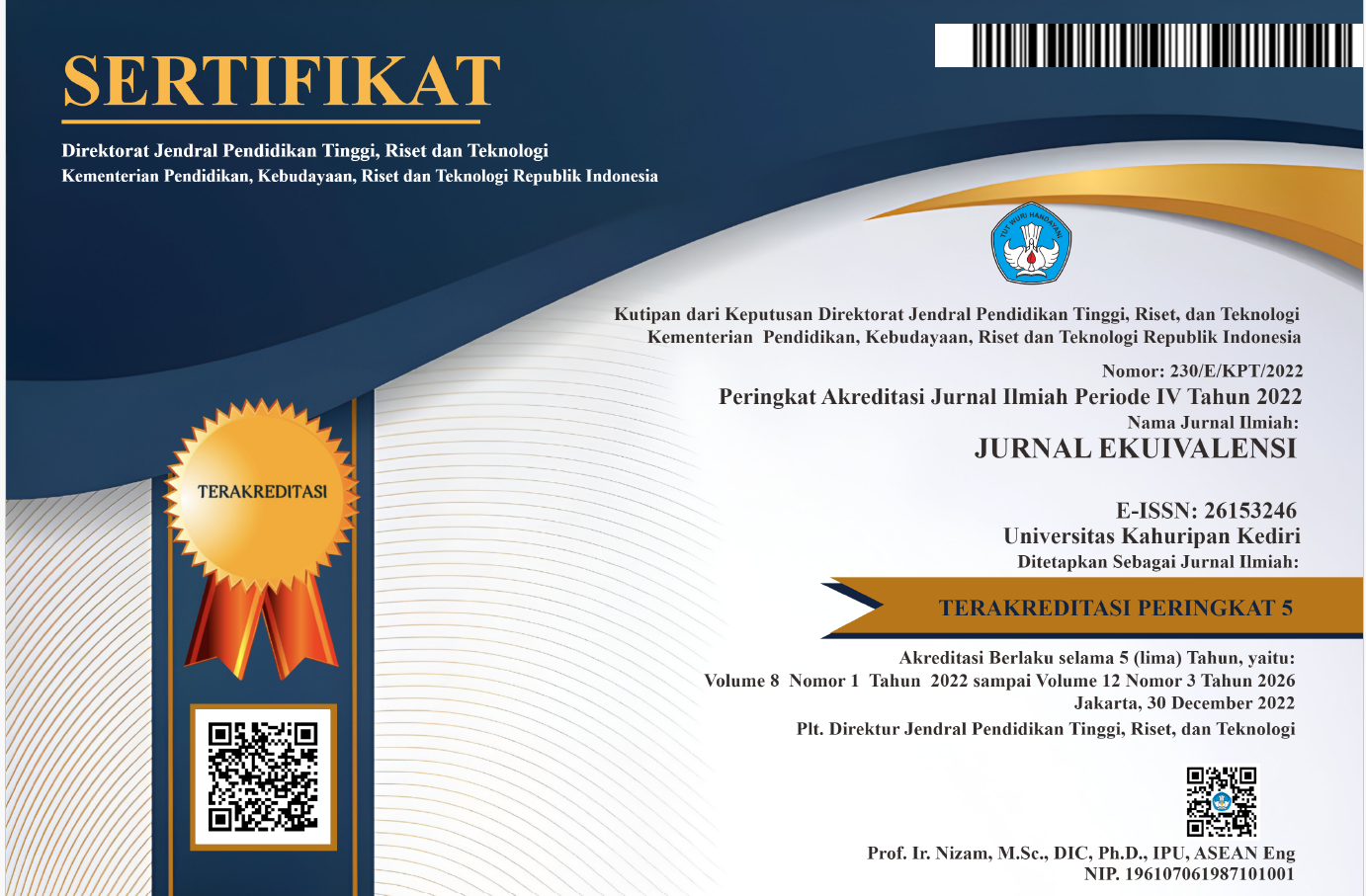Bagaimana Covid-19 Mengubah Struktur Perekonomian Kota Besar Di Pulau Jawa?
DOI:
https://doi.org/10.51158/ekuivalensi.v7i2.630Abstract
Abstrak
Pandemi Covid-19 memengaruhi aktivitas perekonomian masyarakat di semua sektor sehingga output ekonomi mengalami penurunan. Dampak ini dirasakan Indonesia baik di level nasional maupun regional, termasuk lima kota terbesar di Jawa: Jakarta, Bandung, Semarang, Yogyakarta, dan Surabaya. Struktur perekonomian yang sudah dibentuk di kota-kota tersebut dapat bergeser karena dampak yang dirasakan setiap sektor berbeda. Penelitian ini bertujuan untuk mengetahui bagaimana perubahan struktur perekonomian di kota-kota tersebut akibat Covid-19. Analisis yang digunakan adalah dengan menguraikan komponen pertumbuhan PDRB sebelum dan semasa pandemi Covid-19 untuk melihat ada tidaknya perubahan sektor basis, perubahan kecepatan pertumbuhan, perubahan sektor progresif, dan perubahan sektor krisis. Penelitian ini berkesimpulan walaupun setiap kota mempunyai perubahan struktur perekonomian yang berbeda namun mempunyai kesamaan tentang sektor mana yang terimbas paling parah akibat pandemi yaitu berubah menjadi lambat, tidak progresif, dan menjadi krisis semasa pandemi Covid-19. Sektor tersebut adalah penyediaan akomodasi dan makan minum, transportasi dan pergudangan, jasa lainnya, perdagangan besar dan eceran, konstruksi, serta jasa perusahaan. Pemerintah pusat dan daerah perlu mengimplementasikan berbagai strategi untuk memulihkan ketiga sektor tersebut melalui pemberian insentif; kepastian keamanan dan kenyamanan transportasi, akomodasi, tempat rekreasi, dan rumah makan; penguatan daya beli masyarakat; serta melanjutkan proyek konstruksi dan mempermudah pembiayannya.
Kata kunci: Covid-19, Pertumbuhan Kota, Struktur Perekonomian, Location Quotient, Shift Share
Abstract
The Covid-19 pandemic has affected economic activities in all sectors so that economic output has decreased. Indonesia has been severely affected by the COVID-19 pandemic at national and regional levels, including the five largest cities in Java: Jakarta, Bandung, Semarang, Yogyakarta, and Surabaya. The economic structure of those cities could shift because the impact of Covid-19 on each sector is not at the same level. This study aims to find out how the economic structure of these cities has changed due to Covid-19. This study elaborates on the components of GRDP growth whether there are changes in the base sector, growth speed, progressive sector, and crisis sector. This study concludes, although each city has different changes in the economic structure, they have in common about which sectors are most severely affected by the pandemic, namely changing slowly, not being progressive, and becoming a crisis during the Covid-19 pandemic. These sectors are accommodation and food and beverage, transportation and warehousing, other services activities, wholesale and retail trade, construction, as well as business activities. The central and local governments should implement various policies to restore the growth of those sectors by providing incentives; ensuring the safety and comfort of transportation, accommodation, recreation areas, and restaurants; strengthening people's purchasing power; as well as continuing construction projects and facilitating their financing.
Keywords: Covid-19, City Growth, Economic Structure, Location Quotient, Shift Share
References
Atri, H., Kouki, S., & Gallali, M. I. (2021). The Impact of Covid-19 News, Panic and Media Coverage on the Oil and Gold Prices: an ARDL Approach. Resources Policy, 1-11.
Bank Indonesia. (2021). Laporan Perekonomian Provinsi DKI Jakarta. Jakarta: Bank Indonesia.
Bora, D., & Basistha, D. (2021). The Outbreak of Covid-19 Pandemic and Its Impact on Stock Market Volatility: Evidence from a Worst-Affected Economy. Journal of Public Affairs, 1-10.
BPS. (2021). Pertumbuhan Ekonomi Indonesia Triwulan II-2021. Jakarta: BPS.
Budiyanti, E. (2020). Dampak Virus Corona terhadap Sektor Perdagangan dan Pariwisata Indonesia. Info Singkat, 19-24.
Capello, R. (2016). Regional Economics. New York: Routledge.
Cowen, T., & Tabarrok, A. (2015). Modern Principles of Economics. New York: Worth Publishers.
Fuente-Mella, H. d., Rubilar, R., Chahuán-Jiménez, K., & Leiva, V. (2021). Modeling COVID-19 Cases Statistically and Evaluating Their Effect on the Economy of Countries. Mathematics, 1-13.
Gössling, S., Scott, D., & Hall, C. M. (2020). Pandemics, Tourism and Global Change: A Rapid Assessment of Covid-19. Journal of Sustainable Tourism, 1-20.
Hanoatubun, S. (2020). Damapak Covid – 19 terhadap Perekonomian Indonesia. Edupsycouns Journal, 146-153.
Hayakawa, K., & Mukunoki, H. (2021). The Impact of Covid-19 on International Trade: Evidence from The Fist Shock. Journal of The Japanese and International Economies, 1-12.
Hossain, M. (2021). The Effect of The Covid-19 on Sharing Economy Activities. Journal of Cleaner Production, 1-9.
IMF. (2021). World Economic Outlook Update, January 2021. Washington DC: IMF.
Irawan, M. Z., Belgiawan, P. F., Joewono, T. B., Bastarianto, F. F., Rizki, M., & Ilahi, A. (2021). Exploring Activity Travel Behavior Changes During the Beginning of Covid 19 Pandemic In Indonesia. Transportation.
Kemenparekraf. (2021). Tren Industri Pariwisata 2021. Jakarta: Kemenparekraf.
Kurniasih, E. P. (2020). Dampak Pandemi Covid-19 Terhadap Penurunan Kesejahteraan Masyarakat Kota Pontianak. Prosiding Seminar Akademik Tahunan Ilmu Ekonomi dan Studi Pembangunan 2020 (pp. 277-289). Pontianak: Universitas Tanjungpura.
Mourouzi-Sivitanidou, R. (2021). Market Analysis for Real Estate. New York: Routledge.
Nalini, S. N. (2021). Dampak Covid-19 terhadap Usaha Mikro, Kecil dan Menengah. Jurnal Ekonomi & Ekonomi Syariah, 662-669.
Nasution, D. A., Erlina, & Muda, I. (2020). Dampak Pandemi Covid-19 terhadap Perekonomian Indonesia. Jurnal Benefita, 212-224.
Pratikno, D. D., & Sari, C. D. (2021). Analisis Dampak Pandemi Covid-19 Terhadap Perubahan Struktur Perekonomian Provinsi Lampung. Islamic Economomics Journal, 43-60.
Rogerson, C. M., & Rogerson, J. M. (2020). COVID-19 and Tourism Spaces of Vulnerability in South Africa. African Journal of Hospitality, Tourism and Leisure, 382-401.
Suryahadi, A., Izzati, R. A., & Suryadarma, D. (2020). The Impact of COVID-19 Outbreak on Poverty: An Estimation for Indonesia. Jakarta: The SMERU Research Institute.
Susilawati, Falefi, R., & Agus, P. (2020). Impact of COVID-19’s Pandemic on the Economy of Indonesia. Budapest International Research and Critics Institute Journal, 1147-1156.
Thaha, A. F. (2020). Dampak Covid-19 terhadap UMKM di Indonesia. Jurnal Brand, 147-153.
Xu, L., Yang, S., Chen, J., & Shi, J. (2021). The effect of COVID-19 pandemic on port performance: Evidence from China. Ocean and Coastal Management, 1-6.
Yuniati, M., & Amini, R. (2020). Analisis Dampak Covid – 19 terhadap Daya Beli Masyarakat NTB. Jurnal Penelitian Manajemen, 362-368.
Zahara, I. (2021). Dampak Coronavirus (Covid-19) terhadap Kondisi Ekonomi Provinsi Daerah Istimewa Yogyakarta. Jurnal Al Amar, 33-39.
Zayed, N. M., Shahi, S. K., Khan, S., & Afrin, M. (2021). Impact of Coronavirus (COVID-19) on the World Economy, 2020: A Conceptual Analysis Keywords. International Journal of Humanities and Social Science, 1-5.












